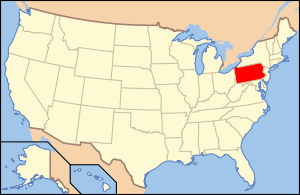Union Station (Pittsburgh)
Union Station | |||||||||||||||||||||||||||||||||||||||||||||||||||||||||||||||||||||||||||||||||||||||||||||
|---|---|---|---|---|---|---|---|---|---|---|---|---|---|---|---|---|---|---|---|---|---|---|---|---|---|---|---|---|---|---|---|---|---|---|---|---|---|---|---|---|---|---|---|---|---|---|---|---|---|---|---|---|---|---|---|---|---|---|---|---|---|---|---|---|---|---|---|---|---|---|---|---|---|---|---|---|---|---|---|---|---|---|---|---|---|---|---|---|---|---|---|---|---|
| Amtrak inter-city rail station | |||||||||||||||||||||||||||||||||||||||||||||||||||||||||||||||||||||||||||||||||||||||||||||
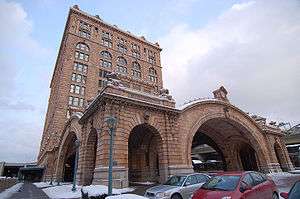 | |||||||||||||||||||||||||||||||||||||||||||||||||||||||||||||||||||||||||||||||||||||||||||||
| Other names |
Penn Station, Pennsylvania Station | ||||||||||||||||||||||||||||||||||||||||||||||||||||||||||||||||||||||||||||||||||||||||||||
| Location |
1100 Liberty Avenue Pittsburgh, Pennsylvania United States | ||||||||||||||||||||||||||||||||||||||||||||||||||||||||||||||||||||||||||||||||||||||||||||
| Coordinates | 40°26′41.1″N 79°59′31.7″W / 40.444750°N 79.992139°WCoordinates: 40°26′41.1″N 79°59′31.7″W / 40.444750°N 79.992139°W | ||||||||||||||||||||||||||||||||||||||||||||||||||||||||||||||||||||||||||||||||||||||||||||
| Owned by | Amtrak | ||||||||||||||||||||||||||||||||||||||||||||||||||||||||||||||||||||||||||||||||||||||||||||
| Line(s) | Pittsburgh Line | ||||||||||||||||||||||||||||||||||||||||||||||||||||||||||||||||||||||||||||||||||||||||||||
| Platforms | 3 + 1 disused | ||||||||||||||||||||||||||||||||||||||||||||||||||||||||||||||||||||||||||||||||||||||||||||
| Tracks | 2 + 3 disused | ||||||||||||||||||||||||||||||||||||||||||||||||||||||||||||||||||||||||||||||||||||||||||||
| Connections | Port Authority of Allegheny County | ||||||||||||||||||||||||||||||||||||||||||||||||||||||||||||||||||||||||||||||||||||||||||||
| Construction | |||||||||||||||||||||||||||||||||||||||||||||||||||||||||||||||||||||||||||||||||||||||||||||
| Bicycle facilities | Yes | ||||||||||||||||||||||||||||||||||||||||||||||||||||||||||||||||||||||||||||||||||||||||||||
| Disabled access | Yes | ||||||||||||||||||||||||||||||||||||||||||||||||||||||||||||||||||||||||||||||||||||||||||||
| Architect | D.H. Burnham & Company | ||||||||||||||||||||||||||||||||||||||||||||||||||||||||||||||||||||||||||||||||||||||||||||
| Architectural style | Beaux Arts | ||||||||||||||||||||||||||||||||||||||||||||||||||||||||||||||||||||||||||||||||||||||||||||
| Other information | |||||||||||||||||||||||||||||||||||||||||||||||||||||||||||||||||||||||||||||||||||||||||||||
| Station code | PGH | ||||||||||||||||||||||||||||||||||||||||||||||||||||||||||||||||||||||||||||||||||||||||||||
| History | |||||||||||||||||||||||||||||||||||||||||||||||||||||||||||||||||||||||||||||||||||||||||||||
| Opened | 1903 | ||||||||||||||||||||||||||||||||||||||||||||||||||||||||||||||||||||||||||||||||||||||||||||
| Rebuilt | 1954, 1988 | ||||||||||||||||||||||||||||||||||||||||||||||||||||||||||||||||||||||||||||||||||||||||||||
| Traffic | |||||||||||||||||||||||||||||||||||||||||||||||||||||||||||||||||||||||||||||||||||||||||||||
| Passengers (2015) |
149,587[1] | ||||||||||||||||||||||||||||||||||||||||||||||||||||||||||||||||||||||||||||||||||||||||||||
| Services | |||||||||||||||||||||||||||||||||||||||||||||||||||||||||||||||||||||||||||||||||||||||||||||
| |||||||||||||||||||||||||||||||||||||||||||||||||||||||||||||||||||||||||||||||||||||||||||||
| Official name | Rotunda of the Pennsylvania Railroad Station | ||||||||||||||||||||||||||||||||||||||||||||||||||||||||||||||||||||||||||||||||||||||||||||
| Designated | April 11, 1973 | ||||||||||||||||||||||||||||||||||||||||||||||||||||||||||||||||||||||||||||||||||||||||||||
| Reference no. | 73001587[2] | ||||||||||||||||||||||||||||||||||||||||||||||||||||||||||||||||||||||||||||||||||||||||||||
| Official name | Pennsylvania Railroad Station | ||||||||||||||||||||||||||||||||||||||||||||||||||||||||||||||||||||||||||||||||||||||||||||
| Designated | April 22, 1976 | ||||||||||||||||||||||||||||||||||||||||||||||||||||||||||||||||||||||||||||||||||||||||||||
| Reference no. | 76001597[2] | ||||||||||||||||||||||||||||||||||||||||||||||||||||||||||||||||||||||||||||||||||||||||||||
| Official name | Pennsylvania Railroad Station Rotunda | ||||||||||||||||||||||||||||||||||||||||||||||||||||||||||||||||||||||||||||||||||||||||||||
| Designated | 1991[3] | ||||||||||||||||||||||||||||||||||||||||||||||||||||||||||||||||||||||||||||||||||||||||||||
| Official name | The Pennsylvanian (Union Station) | ||||||||||||||||||||||||||||||||||||||||||||||||||||||||||||||||||||||||||||||||||||||||||||
| Designated | 2003[3] | ||||||||||||||||||||||||||||||||||||||||||||||||||||||||||||||||||||||||||||||||||||||||||||
Union Station (or Pennsylvania Station, commonly called Penn Station by locals) is a historic train station at Grant Street and Liberty Avenue in Pittsburgh, Pennsylvania. south of the Allegheny River, in the United States. It was one of several passenger rail stations that served Pittsburgh during the 20th century (other stations included the Pittsburgh & Lake Erie Railroad Station, the Baltimore and Ohio Station, and Wabash Pittsburgh Terminal), and it is the only surviving station in active use.
History
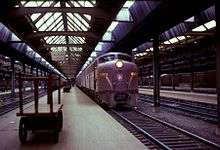
Unlike many union stations built in the U.S. to serve the needs of more than one railroad, this facility connected the Pennsylvania Railroad with several subsidiary lines; for that reason it was renamed in 1912 to match other Pennsylvania Stations. Thus, Union Station is a misnomer, as other major passenger rail carriers served travelers at other stations. For instance, the New York Central used Pittsburgh & Lake Erie Railroad Station, the Wabash Railroad used Wabash Pittsburgh Terminal, and the Baltimore and Ohio Railroad used both the Baltimore and Ohio Station and the Pittsburgh & Lake Erie Railroad Station.
The station building was designed by Chicago architect Daniel Burnham and built 1898–1904. The materials were a grayish-brown terra cotta that looked like brownstone, and brick. Though Burnham is regarded more as a planner and organizer rather than a designer of details, which were left to draftsmen like Peter Joseph Weber, the most extraordinary feature of the monumental train station is his: the rotunda with corner pavilions. At street level the rotunda sheltered turning spaces for carriages beneath wide low vaulted spaces that owed little to any historicist style. Above, the rotunda sheltered passengers in a spectacular waiting room. Burnham's firm completed more than a dozen projects in Pittsburgh, some on quite prominent sites. The rotunda is listed on the National Register of Historic Places.[2] Service began at the station on October 12, 1901.[4]
On January 3, 1954 the Pennsylvania Railroad announced a $31.9 million (2016 dollars) in expansion and renovation for the complex.
.jpg)
By the late 1970s the Penn Central Corporation was accepting bids for the complex and was purchased by the US General Services Administration. There were proposals in 1978 to make the structure into a federal office building, a new city hall and a senior citizens apartment building. Amtrak proposed that the whole structure remain a train station and rail offices.[5] In 1974 County Council proposed having the station be the site of the then planned David L. Lawrence Convention Center.[6] The Buncher Development Company had an option to buy the property as late as 1984.[7]
A $20 million restoration of Union Station began in 1986 to convert the office tower into apartments.[8] It is now called The Pennsylvanian and opened to residents on May 23, 1988. The concourse, which is no longer open to the public, was transformed into a lobby for commercial spaces on the ground floor and the paint cleaned off the great central skylight. The rotunda which once offered shelter for carriages to turn around is now closed to vehicular traffic; modern cars and trucks are too heavy for the brick road surface and risk caving in the roof to the parking garage below it.
Architecture
In September 1978, The New Yorker art critic Brendan Gill proclaimed that Pittsburgh's Penn Station is "one of the great pieces of Beaux-Arts architecture in America...[one of the] symbols of the nation."[9]
Current passenger service
Union Station continues to serve as an active railway station, but through a smaller passenger area on the Liberty Avenue side of the building. It is the western terminus of Amtrak's Pennsylvanian route and is along the Capitol Limited route. Until 2005, Pittsburgh was served by a third daily train, the Three Rivers (a replacement service for the legendary Broadway Limited), an extended version of the Pennsylvanian that terminated in Chicago. Its cancellation marked the first time in Pittsburgh's railway history that the city was served by just two daily passenger trains (the Pennsylvanian and Capitol Limited).
Union Station's Amtrak station code is PGH.
Light rail station
The Port Authority opened a spur to Penn Park station in 1988, to link the 1985 downtown subway to the East Busway.[10] However, the line was difficult to integrate into other services, since it used a portion of an old single-tracked former Pennsylvania Railroad tunnel. This tunnel travels beneath the US Steel Tower, and the building's structural supports are on each side of the tunnel, prohibiting the installation of a second track. The station is still listed as part of the Red Line subway service, but it has had no regular service since 1993.[11]
As late as 2001, the line served no more than two afternoon rush-hour trains. An official reason for the discontinuation of service has not been given; however, it may be attributed to the aforementioned infrastructure limitations as well as limited ridership. The station continues to be used in extremely limited circumstances, including as part of the Port Authority's detoured transportation routes following Super Bowl XLV on 6 February 2011.[12]
Connections
Port Authority bus connections
- 1, 11, 39, 40, 44, P1, P2, G2 P7, P10, P12, P13, P16, P17, P67, P68, P69, P71, P78,
Suburban transit connections
- Beaver County Transit Authority Routes 1, 3, & 4
- Fayette Area Coordinated Transportation Commuter
- Mid Mon Valley Transit Authority Route A
- Myers Coach Lines[13]
- Washington City Transit Commuter & Commuter Express
- Westmoreland County Transit Authority Routes 1 & 4
Grant Street Transportation Center
Across the street is the Grant Street Transportation Center.[14] It serves as an intercity bus station for:
- Greyhound[15]
- Fullington Trailways
- Mountain Line Transit Authority
- New Castle Area Transit Authority Route 71
Gallery
| Wikimedia Commons has media related to Union Station (Pittsburgh). |
-
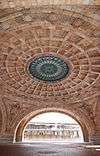
The rotunda
-

Center of the rotunda
-

Union Station, ca. 1910
-
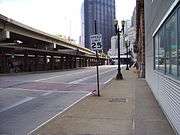
East Busway station near the railroad building.
-

T station
See also
- Pittsburgh & Lake Erie Railroad Station
- Baltimore and Ohio Station (Pittsburgh)
- Grant Street Station
- Wabash Pittsburgh Terminal
References
- ↑ "Amtrak State Fact Sheet, FY2015, Commonwealth of Pennsylvania" (PDF). Amtrak. November 2015. Retrieved 18 March 2016.
- 1 2 3 National Park Service (2008-04-15). "National Register Information System". National Register of Historic Places. National Park Service.
- 1 2 Historic Landmark Plaques 1968-2009 (PDF). Pittsburgh, PA: Pittsburgh History & Landmarks Foundation. 2010. Retrieved 2011-07-28.
- ↑ Lorant, Stefan. "Historic Pittsburgh Chronology". Historic Pittsburgh. University of Pittsburgh Digital Research Library. Retrieved 22 October 2013.
- ↑ "Pittsburgh Post-Gazette - Google News Archive Search". Retrieved 25 March 2016.
- ↑ "The Pittsburgh Press - Google News Archive Search". Retrieved 25 March 2016.
- ↑ "Pittsburgh Post-Gazette - Google News Archive Search". Retrieved 25 March 2016.
- ↑ "The Pittsburgh Press - Google News Archive Search". Retrieved 25 March 2016.
- ↑ "Pittsburgh Post-Gazette - Google News Archive Search". Retrieved 25 March 2016.
- ↑ "The Antique Motor Coach Association of Pennsylvania - The 80's at PAT - 1980 - 1989". 2008. Retrieved 30 August 2009.
- ↑ "Port AUthority Information - Penn Station". Archived from the original on December 22, 2007. Retrieved 30 August 2009.
- ↑ "TransitBlog - Port Authority of Allegheny County: Super Bowl Night Service Detours". TransitBlog. Port Authority of Allegheny County. 4 February 2011. Retrieved 4 February 2011.
- ↑ "Myers Coach Lines - Commuter Schedule". Retrieved 25 March 2016.
- ↑ "Grant Street Transportation Center". Retrieved 25 March 2016.
- ↑ "Bus Station Locator - Greyhound". Retrieved 25 March 2016.
External links
- Amtrak – Stations – Pittsburgh, PA
- Images of Union Station, Pittsburgh
- Burnham's papers at the Carnegie Mellon Library
- Port Authority of Allegheny County Station Info
- Pittsburgh Amtrak Station (USA Rail Guide -- Train Web)
- Great American Stations
- The Pennsylvanian
- Historic American Buildings Survey (HABS) No. PA-1175, "Pennsylvania Railroad Station Rotunda, Liberty, Grant & Eleventh Streets, Pittsburgh, Allegheny County, PA", 7 photos, 6 measured drawings, 3 data pages, 1 photo caption page
- HABS No. PA-1175-A, "Pennsylvania Railroad Station, South Baggage Passage & Canopy, 1101 Liberty Avenue, Pittsburgh, Allegheny County, PA", 4 photos, 9 data pages, 1 photo caption page
- HABS No. PA-1175-B, "Pennsylvania Railroad Station, Open Concourse & Concourse Roof Extension, 1101 Liberty Avenue, Pittsburgh, Allegheny County, PA", 4 photos, 7 data pages, 1 photo caption page

